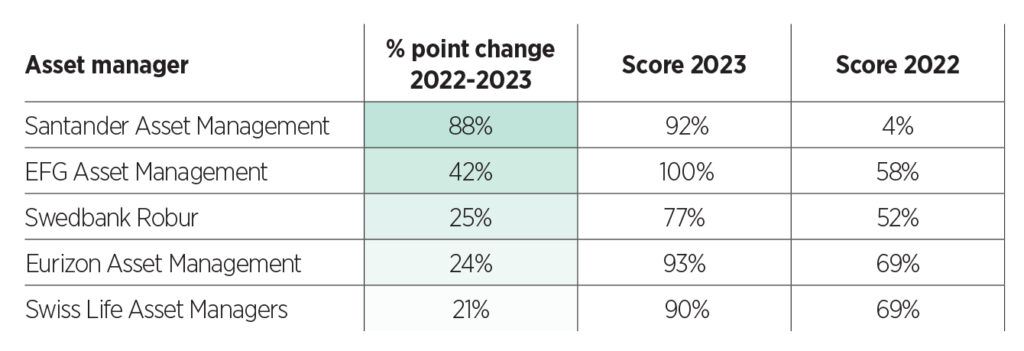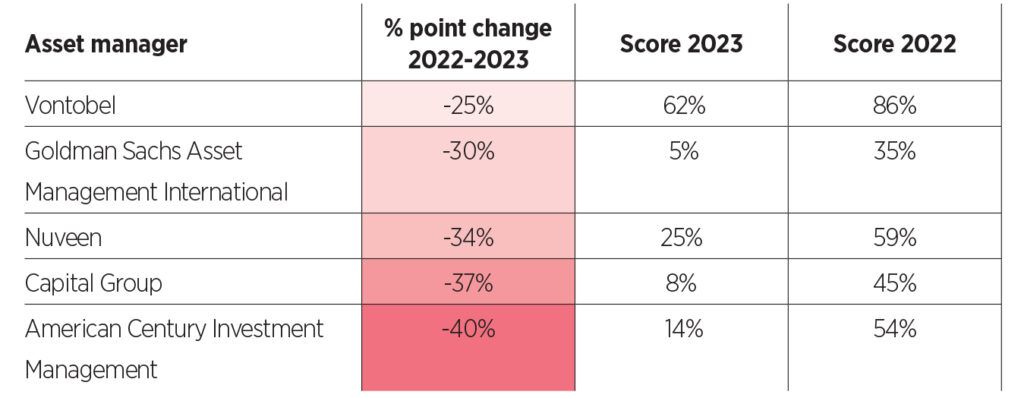Support among asset managers for resolutions aimed at addressing environmental and social issues has crashed to a level not seen before in ShareAction’s fifth annual Voting Matters report, with only 3% of assessed resolutions passed in 2023.
Of the environmental resolutions assessed, just 3% were passed last year compared to 32% in 2021, with asset managers such as JP Morgan AM, State Street Global Advisers and UK-based Baillie Gifford voting against resolutions to protect the environment. That is despite the fact that all three organisations have policies claiming they are working to protect the planet by achieving net-zero emissions, with ShareAction suggesting this could leave them open to claims of hypocrisy and greenwashing. ESG Clarity has contacted the asset managers for comment.
Equally, on social resolutions, the report found a drop in majority support from 15% to 4% in 2023. Among the resolutions that failed to pass due to large asset managers like BlackRock, Vanguard, Fidelity and State Street voting them down, was on asking the owners of high street retailer TK Maxx to report on human rights risks in their supply chain.
Claudia Gray, head of financial sector research at ShareAction, said: “This is the worst result we have seen from asset managers in recent years. Each day we see the impact of global warming with increased floods, fires and loss of the natural world. At the same time, inequality is increasing with many workers struggling to pay their bills while executives take increasing salaries and bonuses.
“The lack of support for key shareholder resolutions in 2023 is deeply concerning. It is even more worrying that some of the world’s largest asset managers are failing to support climate resolutions despite their public commitments to reduce carbon emissions. The findings from our report really question whether the majority of the world’s wealth is being managed effectively. Many asset managers promote their commitment to responsible investment. For their claims to have any credibility they need to vote in favour of more social and environmental resolutions. We are now seeing the complete opposite of this happening.”
Further findings
Ranking 69 of the world’s largest asset managers, the report assesses how they voted at AGMs in 2023, and for the first time makes a comparison to the policies and public statements of the asset managers too. This uncovered a clear distinction between the way European and North American asset managers voted in 2023, with European asset managers supporting 88% of shareholder proposals compared to just 25% of US asset managers.
According to the report, the reason for greater support of ESG proposals by European asset managers could be attributed to the fact that EU regulations are much more robust than those in the US.
Additionally, average support for environmental resolutions among the ‘big four’ asset managers – BlackRock, Fidelity, Vanguard and State Street – fell from 39% to 14% between 2021 and 2023, with support for social resolutions down from 29% to 13%. A resolution at Amazon calling for an assessment of its workers’ union rights, for example, would have passed had the big four voted in favour, along with 68 other key resolutions, showing the huge influence these asset managers have upon the companies they are invested in.
World-leading asset management firms are also blocking transparency on potential human rights violations by voting against resolutions calling on arms manufacturers to disclose how and where their products are being used.
Gray added: “Asset managers are blocking progress on globally agreed goals, such as tackling climate change and ending exploitation of workers, whilst continuing to profit from investment in companies that enable those practices. Action is needed urgently as we are running out of time to reach globally agreed 2030 goals.”
Voting Matters scores
This year’s report did find improvement from some asset managers. Santander Asset Management and EFG Asset Management saw the largest rise in their rankings, but others such as American Century Investment Management and Capital Group saw a significant downgrade from where they were in 2022.
Asset managers who were the biggest risers

Asset managers who were the biggest fallers

“American Century makes investment decisions and votes proxies consistent with their clients’ investment objectives and in a manner the portfolio managers believe will maximise shareholder value,” commented Sarah Bratton Hughes, head of sustainable investing, when asked about their score in the latest Voting Matters report.
“For our integrated strategies, which represent the vast majority of our AUM, the portfolio managers may consider ESG as one of many factors in deciding how to vote proxies in order to meet our clients’ objectives. We have a robust investment-led research framework that guides our proxy voting approach, measuring a company’s practices versus industry peers.”
Bratton Hughes continued: “We have observed that proxy proposals are becoming less quality, commitment and/or disclosure based, thus reflecting a decline in our support. As an active manager of client assets, we are firmly committed to stewardship and providing our clients with ESG integrated and focused investment solutions that meet their risk, return and sustainability goals.”
ESG Clarity also reached out to Capital Group for comment.
Morningstar report
Separately, Morningstar has released a report which confirms some of the findings within ShareAction’s Voting Matters analysis.
The report – Voting on ESG: Ever-Widening Differences – revealed that increasing political hostility toward considering ESG investing issues has translated into a loss of enthusiasm among many US asset managers. At the same time, European asset managers have maintained a high level of support for ESG-related shareholder proposals. As a result, sustainability-focused investors are facing a more complicated landscape, and possibly greater difficulty, when it comes to aligning their investments with their own values.
Independent shareholder support for key ESG resolutions at US companies fell below 50% for the first time in over three years in 2023, with the trend in key resolution support being negative for 12 of the 20 US managers Morningstar assessed. American Century, BlackRock, Capital Group, Goldman Sachs and Janus Henderson were named in the report as showing the strongest negative trends.
In contrast, all 15 of the European managers assessed by Morningstar consistently show very high support for key ESG resolutions, reflecting European investors’ higher sustainability intentions.
Lindsey Stewart, director of investment stewardship research at Morningstar, commented: “Sustainability-focused investors are increasingly questioning whether their manager’s voting policy is well-aligned with their own environmental and social objectives. In Europe, where expectations of proxy-voting support are higher, and several of the US firms have large market share, those questions are being asked with greater intensity.”








